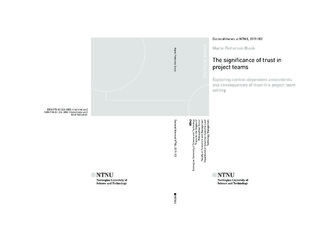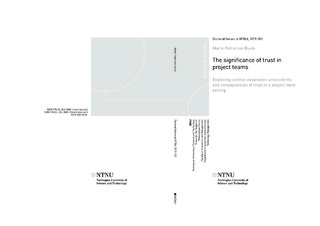| dc.contributor.advisor | Rolfsen, Monica | |
| dc.contributor.advisor | Saksvik, Per Øystein | |
| dc.contributor.author | Buvik, Marte Pettersen | |
| dc.date.accessioned | 2019-10-18T07:07:17Z | |
| dc.date.available | 2019-10-18T07:07:17Z | |
| dc.date.issued | 2019 | |
| dc.identifier.isbn | 978-82-326-3803-1 | |
| dc.identifier.issn | 1503-8181 | |
| dc.identifier.uri | http://hdl.handle.net/11250/2623002 | |
| dc.description.abstract | Summary of the thesis
In today's working life, a large part of the work is organized in projects carried out by project teams. The work is often associated with high uncertainty, time pressure and risk and the project team must solve complex tasks that require diverse skills and expertise. Multidisciplinary, cross-functional project teams create a high degree of interdependence and require continuous coordination, integration and collaboration to succeed. These factors emphasize the need for trust within the project team. However, projects are temporary and the relationships in the teams may be affected by this. Trust is about accepting vulnerability based on positive expectations of the actions of others and is often grounded in experience and assessment of the trustworthiness over time.
This thesis demonstrates how prior relationships among team members influence the development of trust and how the level of trust in the team impacts knowledge sharing and performance. The research has been carried out among project teams within the construction industry in Norway, a traditional project-based industry. A qualitative case study of one project team and a quantitative survey among 31 project teams constitute the data material.
The results indicate that prior relationships and shared experience of working together among some of the team members can positively influence the development of trust and collaboration in the project team and contribute to a positive spiral of trust. Positive relationships makes it easier to create good collaboration routines and help the team to work efficiently from the start. Furthermore, the findings show trust is positively related to knowledge sharing and team performance, but often indirectly. Trust affects knowledge sharing and performance by increasing the commitment. Trusting that their colleagues are both able to and willling to do their work makes team members eager to do whatever is needed to accomplish the project successfully, thus promoting knowledge sharing and team performance.
This thesis shows that trust is significant for creating effective project teams. Leaders should consider the team composition and extend positive relationships as well as facilitate activities and structures that allow team members to demonstrate their competence, get to know each other and build trust. | nb_NO |
| dc.description.abstract | Sammendrag av avhandlingen
I dagens arbeidsliv er mye av arbeidet organisert i prosjekter som utføres av prosjektteam. Arbeidet som skal utføres er ofte forbundet med høy grad av usikkerhet, tidspress og risiko og prosjektteamet skal løse sammensatte oppgaver som krever ulik kompetanse og ekspertise. Tverrfaglige, kryssfunksjonelle prosjektteam skaper høy grad av gjensidig avhengighet og krever kontinuerlig koordinering, integrering og samarbeid for å lykkes. Disse faktorene understreker behovet for tillit i prosjektteamet. Samtidig er prosjekter temporære og relasjonene i teamene kan være preget at dette. Tillit handler om å akseptere sårbarhet basert på en positiv forventning om andres handlinger og bygger ofte på erfaring og vurdering av pålitelighet over tid.
Denne avhandlingen belyser hvordan tidligere relasjoner blant teammedlemmer påvirker utvikling av tillit og hvordan tillitsnivået i teamet påvirker kunnskapsdeling og prestasjoner. Forskningen er gjennomført blant prosjektteam innen bygg- og anleggsbransjen i Norge, en tradisjonell prosjektbasert bransje. Et kvalitativt casestudie av ett prosjektteam og en kvantitativ spørreundersøkelse blant 31 prosjektteam utgjør datagrunnlaget.
Resultatene viser at tidligere erfaring med å jobbe sammen blant noen av teammedlemmene kan påvirke utviklingen av tillit og samarbeid i prosjektteamet og bidra til en positiv spiral av tillit. Positive relasjoner gjør det lettere å skape gode samarbeidsrutiner og bidrar til at teamet jobber effektivt fra starten av prosjektet. Videre viser funnene at grad av tillit i prosjektteamet har en positiv sammenheng med både kunnskapsdeling og teamets prestasjoner, men at denne sammenhengen ofte er indirekte. Tillit påvirker kunnskapsdeling og prestasjon ved å øke engasjementet og forpliktelsen til prosjektet. Tillit til at kollegaene både kan og vil gjennomføre arbeidsoppgavene sine bidrar til at teammedlemmene er villige til å gjøre det som trengs for å gjennomføre prosjektet på en god måte, og dermed øker kunnskapsdelingen og teamets prestasjoner.
Denne avhandlingen viser at tillit er viktig for å skape effektive prosjektteam som leverer godt. Ledere bør være oppmerksomme på teamsammensetningen og videreføre positive relasjoner, samt legge til rette for aktiviteter og strukturer som gir teammedlemmene mulighet for å vise sin kompetanse, bli kjent og utvikle tillit. | nb_NO |
| dc.language.iso | eng | nb_NO |
| dc.publisher | NTNU | nb_NO |
| dc.relation.ispartofseries | Doctoral theses at NTNU;2019:102 | |
| dc.relation.haspart | Paper 1: Buvik, M. P., & Rolfsen, M. (2015). Prior ties and trust development in project teams: A case study from the construction industry. International Journal of Project Management, 33, 1484 -1494.
http://dx.doi.org/10.1016/j.ijproman.2015.06.002 | nb_NO |
| dc.relation.haspart | Paper 2: Buvik, M. P., & Tvedt, S. D. (2016). The impact of commitment and climate strength on the relationship between trust and performance in cross-functional project teams: A moderated mediation analysis. Team Performance Management, 22, 114 - 138.
- Is not included due to copyright avialable at
https://doi.org/10.1108/TPM-02-2015-0011 | nb_NO |
| dc.relation.haspart | Paper 3: Buvik, Marte Pettersen; Tvedt, Sturle Danielsen. The influence of project commitment and team commitment on the relationship between trust and knowledge sharing in project teams. Project Management Journal 2017 ;Volum 48.(2) s. 5-21
https://doi.org/10.1177/875697281704800202 | nb_NO |
| dc.title | The significance of trust in project teams : Exploring context-dependent antecedents and consequences of trust in a project team setting | nb_NO |
| dc.type | Doctoral thesis | nb_NO |
| dc.subject.nsi | VDP::Social science: 200::Economics: 210 | nb_NO |

